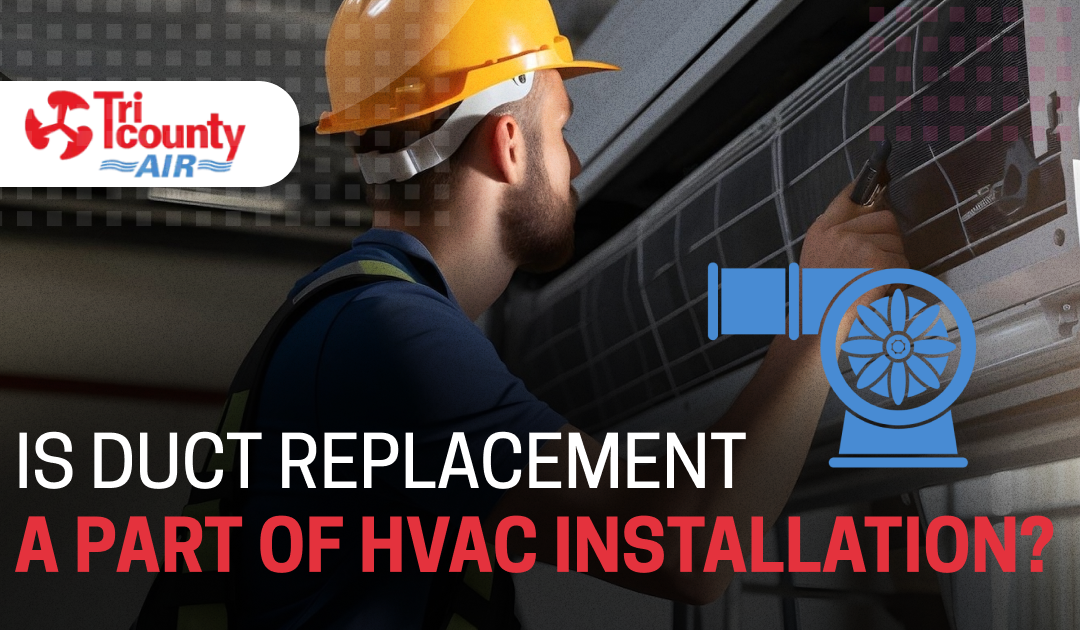Duct replacement doesn’t have to be a part of HVAC installation. Leaving your existing ducts in place is an option if they’re in good condition. If not, then inadequate ductwork can affect the performance and efficiency of your new system. This is not ideal since HVAC installation is an investment and damaged or faulty ducts can affect your comfort, safety, and indoor air quality.
We’ll now explore whether duct replacement should be a part of your next HVAC installation project.
New Ductwork Is Often Recommended
When planning to install a new heating and cooling system, a contractor will often suggest installing new ductwork. Having matching equipment can reduce the frequency of repairs and eliminate issues such as dust, allergies, and odors. Plus, ductwork that’s 10+ years older than your AC or heater may not match its operating requirements.
Signs Your Ducts and HVAC System Should Be Replaced Together
Before replacing your HVAC system, a contractor performs an in-home evaluation to determine whether your ductwork should also be replaced. It’s not always an easy decision to make. But here are some signs the investment in duct replacement may be worthwhile:
- Improperly Sized Ductwork: Air ducts come in different sizes and the dimensions must match the requirements of your air conditioner. The unit won’t work effectively if your ductwork isn’t properly sized. It must be carefully designed to ensure the heating and cooling needs of your entire home are met.
- Damaged Air Ducts: If there are dents, punctures, holes, cracks, and loose connections in your ductwork, conditioned air will escape into unconditioned spaces like the attic or crawl space. Your new system will work much harder to distribute air, but duct replacement can ensure it runs smoothly.
- Poor Indoor Air Quality: Air quality issues can range from allergies and asthma symptoms to increased dust and musty odors caused by mold. If mold is present in ducts, spores, and toxins can spread throughout your home. Poor humidity control can contribute to the problem. Therefore, damaged, deteriorated, or corroded ductwork must be replaced.
- Noisy Ducts: If you hear high-pitched sounds coming from your ductwork, an airflow issue may be the reason. Excess pressure can cause rattling sounds while whistling noises can indicate there’s a blockage in a duct or your ductwork has structural damage. These issues won’t go away without significant repairs or replacing your HVAC ductwork.
- High Utility Bills: No matter how efficient your new HVAC unit is, aging or damaged ductwork will offset any efficiency improvements. Consider duct replacement if your energy bills have been surging. Trapped debris, damage, or poor insulation may be causing this. Only by replacing your HVAC system and ductwork together will you get your utility bills under control.
- Uneven Heating or Cooling: More gaps and holes in your ductwork can lead to consistent temperatures. If some parts of your home are too hot and others too cold, the reason may be in your air ducts. When it can’t distribute air evenly, ductwork should be replaced during the HVAC installation process.
- Insect and Rodent Infestations: Holes and spaces in ductwork provide room for small pests to get inside. Aside from leaving behind waste that can contain bacteria and other pathogens, pests can cause blockages and extensive structural damage to air ducts. Infested ducts should be replaced as soon as possible.
Is Duct Replacement Enough?
At Tri County Air, we help our customers save money over time. Replacing ductwork during HVAC installation can have long-term cost benefits. We also often recommend attic insulation improvements, as this is where much of the conditioned air can be lost.
An attic can be treated with spray foam insulation. It is a liquid that’s sprayed into a space and expands into a foam (open-cell foam seals cracks and spaces to prevent air leakage, while closed-cell foam is an effective air, vapor, and water barrier). Blown-in insulation protects against moisture, mold, pests, and fires, depending on the type. Consult with your HVAC contractor about the best options for your home.
A radiant barrier is another insulation option that can make your HVAC system and ductwork more efficient. It reflects sunlight and is often used with other insulating materials. Some radiant heat barrier coatings can be sprayed, making this process even easier.
Contact Tri County Air
Updating your entire HVAC system is the best solution for improving comfort, efficiency, and indoor air quality. Customers in Charlotte, Manatee, and Sarasota Counties rely on us for duct replacement services that include sizing, sealing, and insulating your air ducts. We’ll ensure you get the most out of your new HVAC unit. To schedule an inspection of your ductwork and ventilation system, request an appointment online or call (941) 485-2222.

